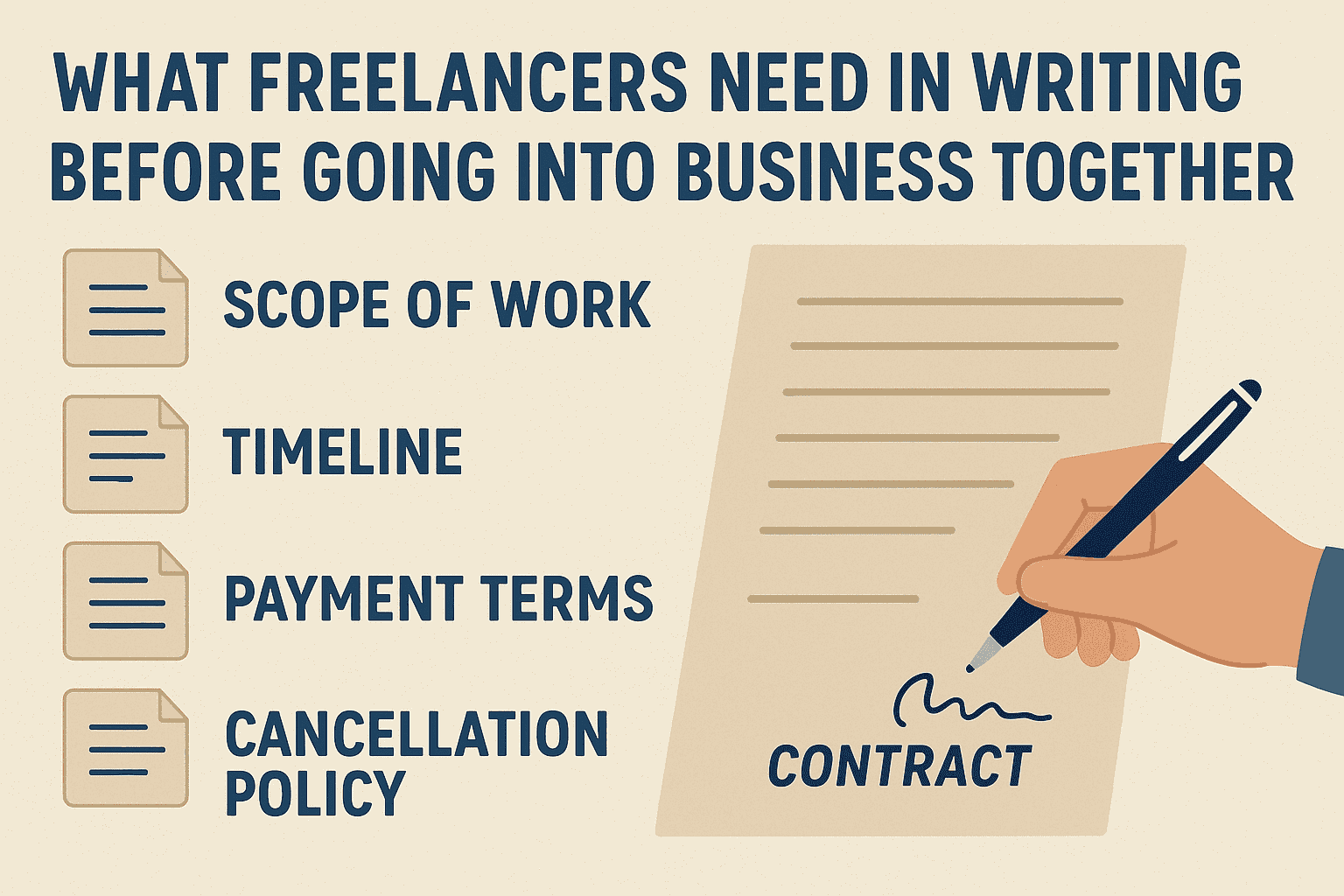What Freelancers Need in Writing Before Going Into Business Together
Freelancers team up all the time. You find someone with skills that match yours, and together you can take on bigger jobs, pitch better clients, or even build something new. It’s exciting stuff. But before you say “let’s go,” you need to put things in writing.
Even if you trust your partner. Even if it’s your best friend. Even if it’s your sibling. You still need a plan on paper.
If you’re ready to partner up, the best place to start is with a free partnership agreement template. It gives you a solid base to work from—without paying a lawyer or figuring it out from scratch. You’ll have all the big things written down, and you can tweak the details as needed.
Let’s talk about what you should write down before jumping in.
Who Does What?
You each bring something to the table. Maybe one of you writes while the other designs. Maybe one handles sales while the other delivers the work. Spell it out.
Write down who owns what. Who answers client emails? Who sets prices? Who pays for tools?
The more clear you are up front, the fewer fights you’ll have later.
Also think about how you’ll handle busy seasons. Will you bring on extra help? Who handles quality checks if you're both swamped?
Define your roles now. It keeps things smooth later.
How Do You Split the Money?
Money talk isn’t always fun, but skipping it causes big problems fast.
Decide how you’ll split income. Is it 50/50? Based on hours? Based on who got the client?
Also decide how you’ll handle costs. If one of you buys software or pays for ads, does that come out of the total before the split? Will you each cover your own gear?
Think about taxes too. Will you file as a partnership? Keep separate records?
If you don’t write this stuff down now, someone’s going to feel burned later.
What Happens When One of You Wants Out?
People change. You might move. Your partner might take a job. Life shifts.
Plan for that.
Write down what happens if one of you wants out. Can they sell their share? Do they walk away with the clients? Does the business keep going?
A simple paragraph about exits can save a big mess down the road.
Also talk about how you’ll end the partnership if needed. Will you dissolve the business? Will one of you keep the name?
What’s the Game Plan?
Are you just teaming up for one project—or are you building a brand? Will you keep your own freelance names or start a new one together?
Talk about your goals.
Maybe you want to keep things small. Maybe you want to grow and hire. Whatever it is, write it down. That way, you know you’re on the same path.
Create a 6-month or 1-year plan. It helps you stay focused and measure progress.
What Tools Will You Use to Stay Organized?
Running a small business means more than just doing the work. You’ll need a way to track tasks, send invoices, and stay on top of deadlines.
Pick your tools early. Google Drive, Notion, Trello—whatever works.
Agree on where files go, how you’ll share passwords (securely), and how you’ll talk day-to-day. Slack? Email? Text?
The smoother the system, the less stress you’ll have when work gets busy.
Think about bookkeeping too. Who tracks payments? Who follows up on invoices?
How Do You Handle Conflict?
No one likes to think about fights, but they happen. Someone misses a deadline. Someone takes on a solo gig that creates overlap. Someone disagrees with a decision.
You don’t need a whole legal drama, but you should have a basic plan.
Will you bring in a third party? Take a break? Follow a vote system?
A clear path for dealing with conflict helps you stay focused on what matters.
Also decide how often you’ll check in. A monthly review or team chat can clear up problems early.
What About Clients and Projects?
Be clear about how you handle leads and deals. If a client comes to one of you, does the other get a cut? If you pitch together, who handles the follow-up?
Decide how you’ll set prices, make quotes, and track deliverables.
What happens if one of you wants to take a break—do you pause joint work or keep rolling?
Lay it out so no one’s left in the dark.
Don’t Wait—Write It Down
Freelancers are used to moving fast. You see a good chance, you jump. That’s great energy. But business partnerships aren’t just about momentum—they’re about trust, clarity, and long-term thinking.
You don’t need a law degree or a long-form contract. You just need a clear, honest agreement.
Use that free partnership agreement template to make it simple. Add your details. Tweak it to fit your style. Sign it, save it, and get to work—with peace of mind.









